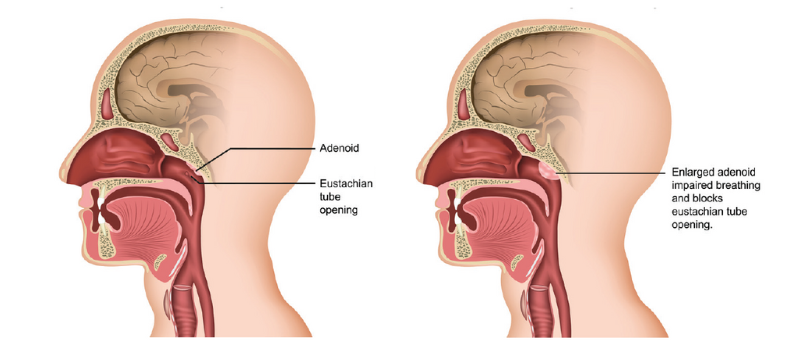Adenoidectomy: A Patient’s Journey
What Are the Adenoids?
Adenoids are small glands located at the back of the nose, above the roof of the mouth. They are part of the immune system and help fight infections by trapping germs and producing antibodies. In young children, adenoids play a vital role in defending against infections. As the child grows, the adenoids shrink and become less important because other parts of the immune system take over.
Problems Caused by Enlarged Adenoids
- Frequent Infections: Repeated nasal congestion or sinus infections.
- Breathing Difficulties: Nasal obstruction, snoring, or trouble breathing through the nose.
- Ear Problems: Blockage of the Eustachian tube, leading to recurrent ear infections or hearing issues.
- Sleep Disturbances: Conditions like sleep apnea or restless sleep.

Why an Adenoidectomy may be recommended?
An adenoidectomy may be necessary if:
- Your child has frequented or chronic nasal or sinus infections.
- Enlarged adenoids are blocking the airway, causing difficulty breathing or sleep apnea.
- Recurrent ear infections or hearing problems persist despite treatment.
- Medications are not improving the symptoms.

Preparing for Surgery
- Fasting: No food for 8 hours before surgery and No water for 2 hours before the surgery.
- Medication: Inform the doctor about any medications your child takes.
- Comfort Items: Bring your child’s favorite toy to help ease anxiety.
- Clothing: Dress your child in loose, comfortable clothing for hospital visit.
What happens during the procedure?
- The surgery is done under general anesthesia so your child will be asleep.
- The surgeon removes the adenoids using an endoscopic technique known as adenoid coblation.
- The procedure usually takes about 15-30 minutes.
- No external cuts or stitches are involved.
Post Surgery Care
After the procedure:
- Your child will be monitored in a recovery room.
- Mild nasal congestion, a runny nose, or a sore throat are normal.
- Your child can go home the same day.
What to expect during recovery
- Nasal Congestion or Runny Nose: This is normal and will improve with time.
- Sore Throat: Usually resolves within a week.
- Mild Bleeding: Spotting is normal, but heavy bleeding requires immediate medical attention.
- Bad Breath: Normal during healing process.
- Mild Fever: A slight temperature increase in the first day or two is expected.
Potential Risks of Adenoidectomy
While adenoid surgery is generally safe, possible risks include:
- Bleeding or infection
- Reaction to anesthesia
- Dehydration: If swallowing is painful, encourage plenty of fluids.
Post-Surgery Care Instructions
- Hydration: Ensure your child drinks plenty of water, clear soups, or non-acidic juices.
- Warning Signs: Seek immediate medical attention if there is heavy bleeding, a high fever, or severe pain.
Quick Tips for Parents
- Stay calm and reassuring to help your child feel comfortable.
- Follow the doctor’s post-operative instructions carefully.
- Plan for quiet activities during recovery, such as watching movies or solving puzzles.
 Patient Login
Patient Login